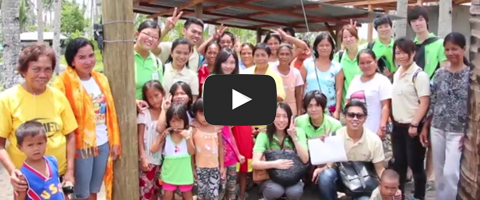BEYOND Tomorrow Asia Summer Program 2014
~Disaster Risk Management in Asia – Visit to the Typhoon-affected Areas of the Philippines~
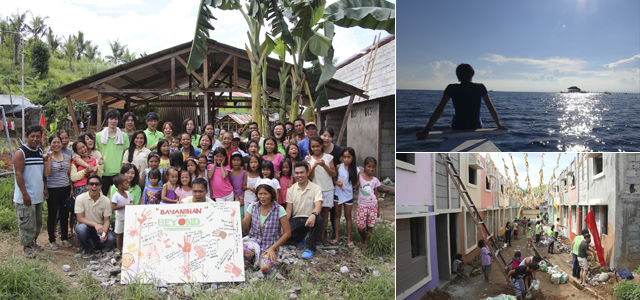
Movie
Overview
In the summer of 2014, BEYOND Tomorrow conducted the BEYOND Tomorrow Summer Global Program in Asia. Students from Tohoku who, overcoming the adversities of the Great East Japan Earthquake and Tsunami, have the will to become active leaders in the world, were selected and visited the island of Leyte in the Philippines, which suffered catastrophic damage from Typhoon Yolanda in November 2013. Participants had the opportunity to share their experiences from the earthquake and tsunami with other people of their age from an area affected by a natural disaster and to discuss with them what they could do to reduce disaster risk in the Asian region in the future. The participants prepared proposals for disaster risk reduction, with an eye to creating a collaborative platform for young people in the Asian region, which suffers large-scale damage from natural disasters, whereby people who have the common experience of experiencing a natural disaster can work together.
Dates
August 12 (Tues) Orientation August 13 (Wed) to August 21 (Thursday) Program in Asia
Objectives
To examine possible frameworks for international collaboration in disaster risk management in the Asian region by having survivors of different natural disasters interact with each other and developing a deeper understanding of similarities and differences. To create a platform for young people of Asia to work together, in collaboration on the shared theme of disaster risk reduction.
Participants
- From Japan: Eight high school students and university students who were living in Iwate, Miyagi, or Fukushima prefectures at the time of the Great East Japan Earthquake and Tsunami and who, overcoming the adversities of the disaster, have the will to become active leaders in the world.
- From the Philippines: Three young people from the disaster-affected regions of the Philippines, who have the will to be actively involved in reducing disaster risk. Participants were selected through an application process.
Japanese Delegation from Tohoku disaster communities affected by 3.11 disaster
 |
Sayaka Sugawara (Robert Alan Feldman Special Scholarship Recipient) Leysin American School in Switzerland Sayaka experienced the disaster in Ishinomaki, and lost her mother, grandmother and great-grandmother to the tsunami. Six months after the disaster she participated in the Summer Davos Forum held in China, and communicated her experiences to global leaders. In future, Sayaka would like to work for a cause helping children who have had similar traumatic experiences to her own, as well as doing international volunteering to help repay the countries that supported Japan after the disaster. She has proactively participated in events and volunteered her time while studying abroad, and is even creating venues herself to convey her experiences to society. She just graduated from Leysin American School in Switzerland in June 2014. |
 |
Nanami Takahashi St. George’s School in Switzerland, Year 12 Nanami went to study abroad in Switzerland through the BEYOND Tomorrow Study Abroad Program. After seeing her life fall apart in front of her own eyes, in her despair she felt as though she had lost the will to live at times, but now thinks that experiencing the disaster opened her eyes to something she had never noticed before. After the disaster, she traveled to Minsk in the Republic of Belarus as a representative of the disaster region, and taught people there, including the mayor and high school students about her experience. From here on, she would like to go beyond what the media communicates, and try to express her thankfulness for the support and encouragement she received at the time of the disaster. |
 |
Riko Fujii (BEYOND Tomorrow/Teruhide Sato Special Scholarship Recipient) Waseda University, Department of Political Science and Economics Riko lost her grandfather in the tsunami. The people and places she was close to were all taken from her. She dreams of becoming a politician in the future who can represent the interests of people in areas affected by disasters and make the government listen to their voices. Since studying abroad in Malaysia, she wants to communicate lessons she learned from the disaster to a larger audience, and believes that understanding how to deal with earthquakes is important. She also wants to help raise disaster awareness in Southeast Asia in hopes of reducing damage from future disasters. |
 |
Kokurin Saijo Takushoku University, Department of International Studies Kokurin was born in Dalian, China. She came to Japan when she was a 1st year middle school student, and lived in Minamisanriku until she graduated from high school. She lost her home in the disaster. In 2013 she participated in the TICAD V event, and she ran a booth at the event to help inform others about the situation in the areas affected by the disaster, and convey thanks to African leaders for emergency aid after the disaster. She has taken active steps to engage with Rwanda and Ghana, and to learn Swahili and Arabic. Using lessons learned from the disaster, Kokurin wants to use education to encourage economic growth in developing nations in Africa. In the future she would like to find ways to combat poverty as a leader from Tohoku. While she is very interested in helping people in the Middle East and Africa, she would also like to find ways to contribute to the revitalization of her hometown of Minamisanriku. |
 |
Haruka Kurosawa (BEYOND Tomorrow/Chikara Funabashi Special Scholarship Recipient) Dokkyo University, Foreign Language Department Haruka’s high school became a refuge area after the disaster, prompting him to participate in efforts such as food distribution and giving care to the evacuees. When he saw the chaos surrounding the distribution of food and other commodities, Haruka suspected that there must be similar sights in impoverished countries as well. His dream is to work for the United Nations as an expert in developing systems for food management in developing countries. At his university, he is conducting research on poverty and economic disparity. Through this program, he would like to further his understanding of history in Asia and the current issues it faces to move him closer to achieving his goals. |
 |
Ena Kanno (BEYOND Tomorrow/TOMODACHI Special Scholarship Recipient) Waseda University, School of Commerce When he saw his neighborhood houses getting swept away by the tsunami, a fire was lit within Ena. He is convinced that the fact that he survived despite such tragic events has a meaning, and as a Tohoku native who experienced the disaster, he feels that his mission in life is to become a successful businessman. As such, he has decided to start an IT business, as it has always been a field that interested him. Ena hopes to create a service that makes a large global impact through the internet. In February of 2014, he invited students from Boston to visit Fukushima, and acted as their tour guide as a way of bringing together Tohoku and overseas partners. |
 |
Masahiro Kikuchi (BEYOND Tomorrow/Project HOPE Special Scholarship Recipient) University of Tsukuba, School of Social and International Studies Masahiro lost his parents at his hometown of Rikuzentakata. Having demonstrated his leadership skills as a student council president in high school, Masahiro further developed these skills as the 14th High School Peace Ambassador, travelling to the United Nations headquarters in Switzerland. When he experienced the support offered by the global community after the disaster, Masahiro felt the importance of international relations. He believes that Japan’s mission moving forward is to communicate to the world the necessity of disaster prevention. Masahiro’s dream is to engage in regional autonomy in order to lead the way for Tohoku’s recovery. In particular, Masahiro is concerned about the precarious situation many Tohoku natives find themselves in after losing their jobs and struggling in the difficult economy. He hopes to contribute in solving this unemployment problem. Believing that he must expand his perspective beyond the borders of Japan, he decided to participate in this year’s Asia Program. |
 |
Hitomi Sasaki University of California, San Diego Hitomi experienced the disaster in Kesennuma and lost her home. While in middle school, she learned how vastly different people’s lives can be depending on where they are born. She realized how unfair this can be, especially for people in developing nations, and hopes to work to address this in the future. She would like to help form a bridge between Japan and other nations, similar to how so many countries supported Japan after the earthquake and tsunami. To realize her dreams, she wants to improve her language ability and acquire a stronger global perspective. After spending 2 years at Foothill College in California in the U.S., she plans to enter University of California, San Diego. There, she will study International Relations, and she hopes to use what she learns to help address issues such as human trafficking, poverty, starvation, and other global issues. |
Filipino Delegation from Yolanda affected communities
 |
Francisco C. Banguis Jr. BA Communication Arts, University of Philippines Visayas Tacloban College Born in Dagami, Leyte Island. Having hoped to help his parents economically in the future, Francisco decided to pursue his study in the university while many of his high school peers did not continue to higher education. There Francisco was elected as the Chairperson of University of the Philippines Visayas Tacloban College Student Council in 2013. He also joined Kizuna project in March 2013, and visited Kuji city in Iwate Prefecture, Japan as the youth Ambassador. After the typhoon Yolanda, he, as a student leader, initiated a move for the students in need. Having experienced the disaster, he hopes to empower young individuals to contribute to rebuilding Tacloban. With his background as the participant of Kizuna project, he decided to take part in BEYOND Tomorrow Asia Program, and hopes to become a bridge between the Philippines and Japan. 。 |
 |
Charles Vincent C. Marnarang Civil Servant, Provincial Government of Leyte Born in Tacloban City, Leyte Island. Despite the financial difficulties Charles had in the past, his family supported him in any means to finish his studies. During his university days, he was elected councilor in the student council. He also joined reputable organizations within and outside campus. He was also selected as one of the participants of the Japan-East Asia Network of Exchange for Students and Youth (JENESYS 2.0), and he visited Kyoto, Japan in 2013 to represent his country as a Philippine Youth Ambassador. Seeing the devastation of his hometown after typhoon Yolanda hit, he hopes to contribute to society by supporting people in need and empower the youth by helping his hometown rise again in simple ways. During the BEYOND Tomorrow Asia Program, he wants to share with students from Tohoku not only the awful experience of the disaster but also its glorious past and beauty of Tacloban. |
 |
Jessa Rapirap Capitol University, BS Education (English) Originally from Cagayan de Oro City, Jessa is studying education at Capitol University. She has an experience of being affected by Typhoon Yolanda and currently participates in disaster risk reduction programs organized by Japan Foundation, Manila. Jessica has experience in translation work and also peace process training in Mindanao. Her interests include journalism and singing. |
Program
Orientation
Pre-rietnation Schedule
August 12 (Tues)
| Time | Activities |
|---|---|
| Morning | Orientation Share the advance assignment and prepare for the speaker sessions |
| Afternoon | Lunch Speaker session (1): The situation in the Philippines Speaker session (2): Typhoon Yolanda and support for recovery Video viewing “Preparation of a presentation about the situation in Tohoku” “Preparation of items to take” |
| Evening | Dinner Preparation of a team charter |
Before the program in the Philippines, the students participated in pre-orientation. The pre-orientation allowed participants to deepen their understanding of the Philippines and the damage caused by Typhoon Yolanda by hearing a lecture from a United Nations University researcher from the Philippines about the Philippines and a lecture from an expert who was in engaged in the emergency assistance activities on the island of Leyte in the Philippines after Typhoon Yolanda struck. Participants also considered what they wanted to achieve in the Philippines, and debated what they should communicate in the Philippines as ambassadors from Tohoku, and prepared presentations in English.。
Speaker bios
Speaker Session (1): The situation in the Philippines
We invited a lecturer from the Philippines to give a lecture about the socio-economic situation in the Philippines today, and the students were able to learn about the different social issues the Philippines battles, such as poverty and regional disparity.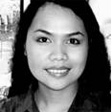 Johanna Paula Diwa-Acallar
Programme Associate, United Nations University Institute for Sustainability and Peace (UNU-ISP)
Johanna Paula Diwa-Acallar
Programme Associate, United Nations University Institute for Sustainability and Peace (UNU-ISP)
Johanna Paula Diwa-Acallar joined as Programme Associate for the Postgraduate Programme of UNU-ISP. She is a Ph.D. candidate in Comparative and International Education at Hiroshima University where she also received a Masters of Education in Educational Administration and Human Sciences. She had professional training in the Ed.D. Programme in the same university. Ms. Diwa graduated from the University of the Philippines, and completed MA coursework in Philosophy. She also studied International Relations at the International University of Japan.
Speaker session (2): Typhoon Yolanda
Participants heard from an expert who was in engaged in the emergency assistance activities after Typhoon Yolanda struck about the situation on the ground, challenges and needs in the support activities, and organized their thoughts about the state of the disaster-struck area in the Philippines ahead of their visit.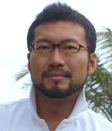 Ryoji Noritake
Project HOPE Consultant
Ryoji Noritake
Project HOPE Consultant
Formerly a director of the Health and Global Policy Institute, Ryoji Noritake is consultant with U.S. international medical support group Project HOPE. He has been in charge of disaster recovery assistance in Japan as well, and has been a frequent visitor to disaster-affected areas, working to coordinate with overseas organizations on site. Currently he is primarily involved in the efforts in the Philippines after it was struck by the typhoon. He studied at the University of Central Oklahoma, before graduating from the Faculty of Policy Management at Keio University. He has a Masters in Medical Anthropology from the University of Amsterdam in The Netherlands. His hobby is haiku and his pen name for haiku is “Ryoji”. He is a Fellow with the Health and Global Policy Institute.
Asia Program
Asia Summer Program Schedule
| City | Activities | |
|---|---|---|
| August 12 (Tues) | Tokyo | Orientation (Stay overnight in Tokyo) |
| August 13 (Wed) | Tokyo to Manila | (Arrival; Meet up with students from the Philippines; Orientation and icebreaking) (Stay overnight in Manila) |
| August 14 (Thurs) | Manila | Visit the Embassy of Japan, JICA, and the Center for Disaster Preparedness (Stay overnight in Manila) |
| August 15 (Fri) | Manila to Tacloban | (Afternoon) Arrive; Tour the disaster-stricken area (Evening) Formulate a hypothesis and plan the research (Stay overnight in Tacloban) |
| August 16 (Sat) | Tacloban | Visit Operation Compassion and tour the temporary housing construction business Cultural exchange with the regional community; Visit to an elementary school (Union Elementary School) (Stay overnight in Tacloban) |
| August 17 (Sun) | Tacloban | (Morning) Temporary housing volunteer activities (Afternoon) Cultural exchange with students from the University of the Philippines (Evening) Dinner party with local people (Stay overnight in Tacloban) |
| August 18 (Mon) | Tacloban to Cebu | Arrival (All day) Beach activities and reflection Preparation of proposals (Stay overnight on Cebu) |
| August 19 (Tues) | Cebu | (All day) Tour of Caohagan Island (Stay overnight on Cebu) |
| August 20 (Wed) | Cebu to Manila | Closing plenary and proposal presentations Reception (Stay overnight in Manila) |
| August 21 (Thurs) | Return to Tokyo |
The Asia Program provided the students with a process for preparing proposals via the following steps.
▼ 2. Field work at the site of the damage from Typhoon Yolanda (Leyte: August 15 to August 18, 2014) ▼ 3. Processing lessons learned in field work and preparation of proposals (Cebu: August 18 to August 20, 2014) ▼ 4. Proposal presentations (Manila: August 20 to August 21, 2014)
Provide a framework for disaster risk management (Manila)
The participants visited JICA, which delivers development aid and disaster relief in the Philippines, and the Center for Disaster Preparedness, an organization specializing in disaster risk management. Participants obtained the latest information about the social situation in the Philippines and learned about disaster risk management in the Philippines and the kind of recovery activities that are going ahead on Leyte in response to the damage from Typhoon Yolanda.
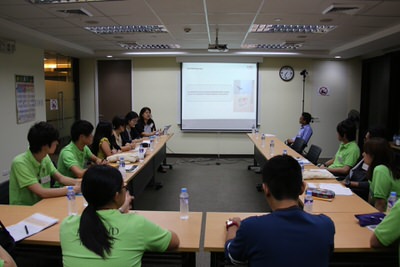 Self-introductions and orientation
Self-introductions and orientation
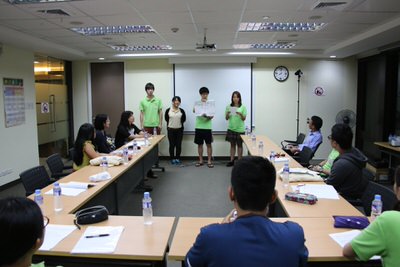 Presentation about the Great East Japan Earthquake and Tsunami
Presentation about the Great East Japan Earthquake and Tsunami
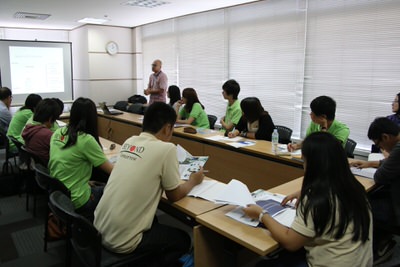 Lecture by a JICA expert
Lecture by a JICA expert
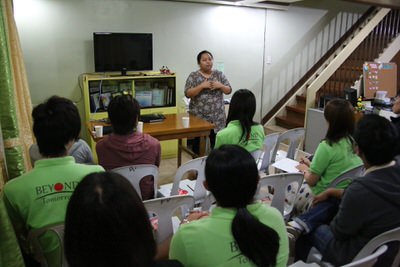 Lecture by a local NGO
Lecture by a local NGO
Field work at the site of the damage from Typhoon Yolanda
The participants visited various places on Leyte, which was struck by Typhoon Yolanda (known as Typhoon No. 30 in Japan) in November 2013. They did field work such as visiting the temporary housing and the coastal area where building is prohibited, and interviewing local residents. In addition, by participating in volunteer work for a project that is building homes, and by having opportunities to interact with local young people, the participants were made very aware of the after-effects of the disaster while at the same time forming friendly relationships with the local people.
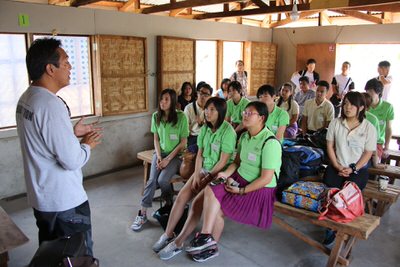 Explanatory session from an NGO that provides temporary housing assistance
Explanatory session from an NGO that provides temporary housing assistance
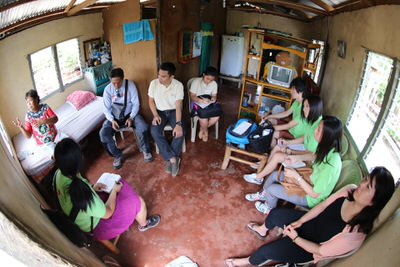 Interview with temporary housing residents
Interview with temporary housing residents
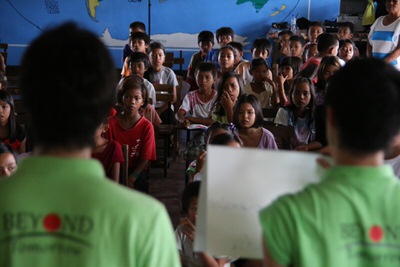 Visiting a local elementary school and giving a presentation about natural disasters
Visiting a local elementary school and giving a presentation about natural disasters
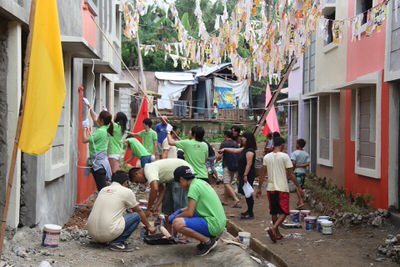 Volunteer work in the local community
Volunteer work in the local community
Processing lessons about frameworks and fieldwork (Cebu)
Having been equipped with frameworks for disaster risk management in Manila, and having deepened their understanding of local opinions through the field work on Leyte, participants travelled to Cebu, where they worked on processing what they had learned. They were provided with an opportunity to consider what the challenges were on site, what they could do themselves, and what role they should fulfill as survivors of natural disasters in the Asian region. The participants processed what they had learned through discussions, and worked on preparing their proposals. In addition, the beach activities and recreation time allowed the students from Japan and the Philippines to overcome the language barrier and form friendships.
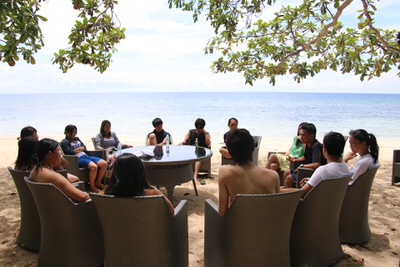 Reflection
Reflection
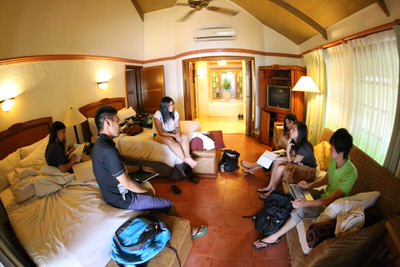 Team discussions to prepare proposals
Team discussions to prepare proposals
Proposal presentations (Manila)
The participants gave presentations on what they had learned in the three cities for guests. The proposal presentations were attended by leaders active in various different fields in the Philippines, including government, business, NGOs, and the media. The students from Japan and the Philippines, who had spent the one week closely together, presented their proposals together and showed that the first step had been taken to build the foundation of a platform for young people in Asia regarding disaster risk management.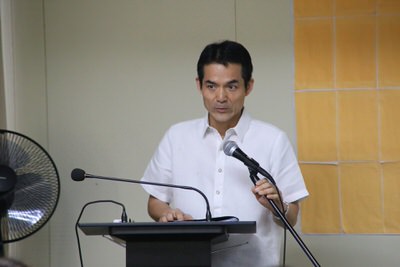 Closing plenary and proposal presentation (1)
Closing plenary and proposal presentation (1)
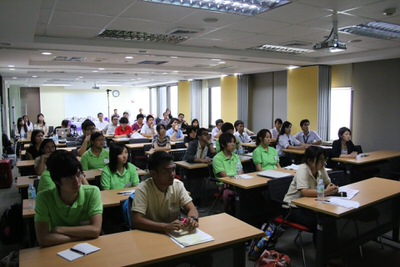 Closing plenary and proposal presentation (2)
Closing plenary and proposal presentation (2)
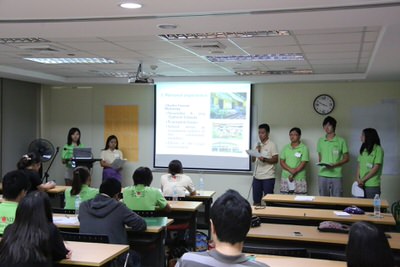 Closing plenary and proposal presentation (3)
Closing plenary and proposal presentation (3)
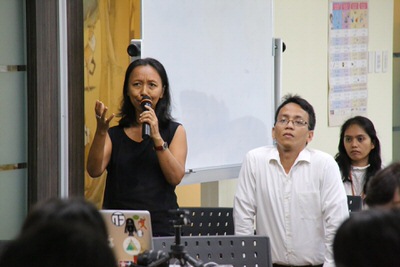 Closing plenary and proposal presentation (4)
Closing plenary and proposal presentation (4)
Supporters
 Japan Foundation, Manila
Japan Foundation, Manila

